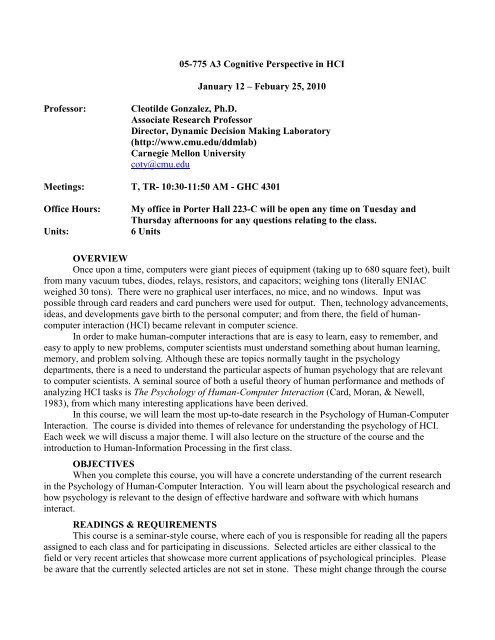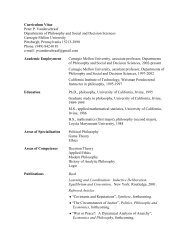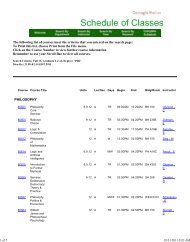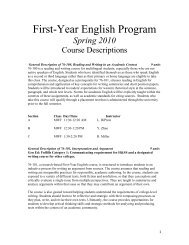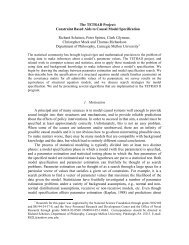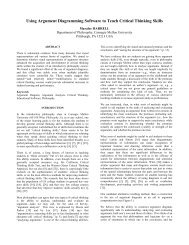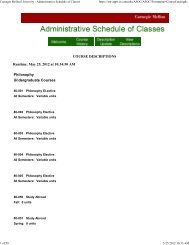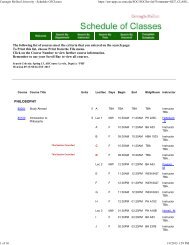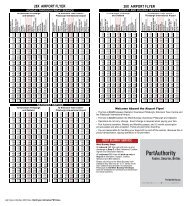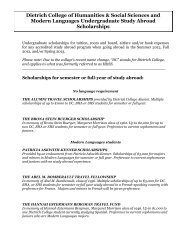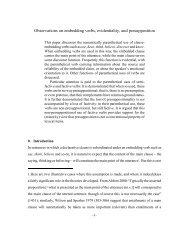syllabus - College of Humanities and Social Sciences - Carnegie ...
syllabus - College of Humanities and Social Sciences - Carnegie ...
syllabus - College of Humanities and Social Sciences - Carnegie ...
Create successful ePaper yourself
Turn your PDF publications into a flip-book with our unique Google optimized e-Paper software.
05-775 A3 Cognitive Perspective in HCI<br />
January 12 – Febuary 25, 2010<br />
Pr<strong>of</strong>essor:<br />
Cleotilde Gonzalez, Ph.D.<br />
Associate Research Pr<strong>of</strong>essor<br />
Director, Dynamic Decision Making Laboratory<br />
(http://www.cmu.edu/ddmlab)<br />
<strong>Carnegie</strong> Mellon University<br />
coty@cmu.edu<br />
Meetings: T, TR- 10:30-11:50 AM - GHC 4301<br />
Office Hours:<br />
Units:<br />
My <strong>of</strong>fice in Porter Hall 223-C will be open any time on Tuesday <strong>and</strong><br />
Thursday afternoons for any questions relating to the class.<br />
6 Units<br />
OVERVIEW<br />
Once upon a time, computers were giant pieces <strong>of</strong> equipment (taking up to 680 square feet), built<br />
from many vacuum tubes, diodes, relays, resistors, <strong>and</strong> capacitors; weighing tons (literally ENIAC<br />
weighed 30 tons). There were no graphical user interfaces, no mice, <strong>and</strong> no windows. Input was<br />
possible through card readers <strong>and</strong> card punchers were used for output. Then, technology advancements,<br />
ideas, <strong>and</strong> developments gave birth to the personal computer; <strong>and</strong> from there, the field <strong>of</strong> humancomputer<br />
interaction (HCI) became relevant in computer science.<br />
In order to make human-computer interactions that are is easy to learn, easy to remember, <strong>and</strong><br />
easy to apply to new problems, computer scientists must underst<strong>and</strong> something about human learning,<br />
memory, <strong>and</strong> problem solving. Although these are topics normally taught in the psychology<br />
departments, there is a need to underst<strong>and</strong> the particular aspects <strong>of</strong> human psychology that are relevant<br />
to computer scientists. A seminal source <strong>of</strong> both a useful theory <strong>of</strong> human performance <strong>and</strong> methods <strong>of</strong><br />
analyzing HCI tasks is The Psychology <strong>of</strong> Human-Computer Interaction (Card, Moran, & Newell,<br />
1983), from which many interesting applications have been derived.<br />
In this course, we will learn the most up-to-date research in the Psychology <strong>of</strong> Human-Computer<br />
Interaction. The course is divided into themes <strong>of</strong> relevance for underst<strong>and</strong>ing the psychology <strong>of</strong> HCI.<br />
Each week we will discuss a major theme. I will also lecture on the structure <strong>of</strong> the course <strong>and</strong> the<br />
introduction to Human-Information Processing in the first class.<br />
OBJECTIVES<br />
When you complete this course, you will have a concrete underst<strong>and</strong>ing <strong>of</strong> the current research<br />
in the Psychology <strong>of</strong> Human-Computer Interaction. You will learn about the psychological research <strong>and</strong><br />
how psychology is relevant to the design <strong>of</strong> effective hardware <strong>and</strong> s<strong>of</strong>tware with which humans<br />
interact.<br />
READINGS & REQUIREMENTS<br />
This course is a seminar-style course, where each <strong>of</strong> you is responsible for reading all the papers<br />
assigned to each class <strong>and</strong> for participating in discussions. Selected articles are either classical to the<br />
field or very recent articles that showcase more current applications <strong>of</strong> psychological principles. Please<br />
be aware that the currently selected articles are not set in stone. These might change through the course
<strong>of</strong> the semester, <strong>and</strong> you are encouraged <strong>and</strong> welcomed to make suggestions. I will e-mail the papers to<br />
you at least two days before each class.<br />
You may volunteer to be the lead discussant <strong>of</strong> a paper assigned to the class. If no one<br />
volunteers to be a lead discussant in a class, then one <strong>of</strong> you will be r<strong>and</strong>omly assigned at the beginning<br />
<strong>of</strong> the class to lead the discussion <strong>of</strong> an article. The goal <strong>of</strong> the lead discussant is to introduce the paper<br />
selected for discussion <strong>and</strong> guide the discussion <strong>of</strong> the article with the rest <strong>of</strong> the class. This seminar is<br />
an interactive course where every participant is expected to have vigorous exchanges <strong>of</strong> ideas with all<br />
the participants. Every participant in this seminar is expected to read <strong>and</strong> critique each <strong>of</strong> the readings<br />
planned for the day.<br />
In advance, before coming to the class, you are encouraged to prepare a critique for each article<br />
(see worksheet for critiques below), which could be used as your own guide to discuss the article. You<br />
are also responsible for bringing ONE question pertinent to each article which needs to be addressed<br />
during the discussion <strong>of</strong> that article. Please make sure that your questions are addressed in class.<br />
Worksheet for critiques <strong>of</strong> articles<br />
Reading original articles helps us learn first-h<strong>and</strong> how research ideas are formulated, tested,<br />
analyzed, <strong>and</strong> interpreted. In analyzing each research article, try to answer the following questions:<br />
1. What was the main research question?<br />
2. What methods were used to study this question <strong>and</strong> why?<br />
3. Was the study an experiment (involving manipulated variables) or a correlational study (involving<br />
only measured variables)?<br />
4. What was the outcome <strong>of</strong> interest (dependent variable) <strong>and</strong> how was it measured?<br />
5. What data were collected?<br />
6. What were the primary findings?<br />
7. What interpretations were made <strong>of</strong> the findings?<br />
8. How did researchers deal with quality control issues (ethics, validity, reliability, <strong>and</strong> so forth)?<br />
9. What research would usefully clarify or extend the present findings?<br />
Essays<br />
In addition, every Tuesday before the class starts (before 10:30AM), you must submit an essay<br />
that summarizes the theme <strong>of</strong> discussion <strong>of</strong> the previous week, <strong>and</strong> the implications <strong>and</strong> applications <strong>of</strong><br />
these theme to the design <strong>of</strong> interactive systems <strong>and</strong> HCI. The essay should present your critical<br />
thinking on the readings <strong>and</strong> the Psychology theme <strong>of</strong> the previous week, as well as the implications to<br />
HCI. Your goal is to write down your own thesis (a declaration <strong>of</strong> your belief) <strong>and</strong> defend your opinion<br />
through the reading <strong>of</strong> original articles you have analyzed <strong>and</strong> critiqued in the previous week. You are<br />
also encouraged to discuss <strong>and</strong> include articles you found relevant to the theme <strong>of</strong> discussion, even if<br />
they are not on the reading list.<br />
Please limit your essay to 2 to 3 pages single-spaced with 1'' margins. A main portion <strong>of</strong> your<br />
essay will consist <strong>of</strong> arguments to support <strong>and</strong> defend your belief, <strong>and</strong> another main portion <strong>of</strong> your<br />
essay should include the implications <strong>and</strong> applications <strong>of</strong> the Psychology theme to HCI. Feel free to<br />
organize your essay with subtitles as it applies to your thinking. All points must relate to the major topic<br />
<strong>of</strong> the class corresponding to the week previous to your essay.<br />
Please Email you essay before the deadline to: coty@cmu.edu. Please use a subject in the<br />
message that starts with "05775" <strong>and</strong> identifies the theme that the essay refers to.<br />
The last essay is due on March 2nd, but there is no class on March 2nd. The last class is on<br />
February 25.
GRADING<br />
Grades for 05-775 will be computed as follows:<br />
30% - Quality <strong>of</strong> your leading discussion <strong>of</strong> readings in class. Because the assignment <strong>of</strong> the<br />
leader is first voluntary, <strong>and</strong> second by assignment if no one volunteers, if you are assigned to lead the<br />
discussion <strong>of</strong> an article <strong>and</strong> you are not present in class, you will automatically loose 5% <strong>of</strong> your final<br />
grade.<br />
10% - Quality <strong>of</strong> your participation in discussing the readings in class that you don't lead. This<br />
implies that you will need to attend all the classes in order to participate in class discussions. If you<br />
know you will be absent in a class date, please discuss this with me during the first week <strong>of</strong> the course.<br />
60% - Quality <strong>of</strong> your essays regarding the theme <strong>of</strong> the week. Each essay is worth 10%, note<br />
there are 7 weeks in the course. This means that you may: turn in only 6 essays or turn in all 7 <strong>and</strong><br />
drop the lowest grade essay (your choice).<br />
Quality grading will be directly based on my experience in this field <strong>and</strong> my experience with<br />
judging the writing <strong>and</strong> thinking <strong>of</strong> graduate students in general. You will receive written or oral<br />
feedback from me regarding each essay within one week <strong>of</strong> the deadline <strong>of</strong> your essay.<br />
There are no exams in this class.<br />
SCHEDULE<br />
Date<br />
Topic & Readings<br />
____________________________________________________________________________________<br />
Introduction to HIP <strong>and</strong> the Psychology <strong>of</strong> HCI.<br />
I will introduce the course, <strong>syllabus</strong>, policies, etc. Then, I will present a brief introduction to the<br />
Human Information Processing (HIP) system <strong>and</strong> different related research questions addressed in HCI<br />
<strong>and</strong> the need for the HIP information. This week will serve as an introduction to the HIP system.<br />
Discussion <strong>of</strong> articles will start on January 14th.<br />
Jan 12<br />
Jan 14 Card, Moran & Newell, 1983, chapter 2<br />
Olson & Olson, 1990<br />
Proctor & Vu, 2006<br />
____________________________________________________________________________________<br />
The Perceptual System<br />
We will cover principles from Perception in Psychology relevant to the design <strong>of</strong> interactive<br />
s<strong>of</strong>tware. We will attempt an underst<strong>and</strong>ing <strong>of</strong> how to use human perception principles to design<br />
guidelines <strong>and</strong> make design choices.<br />
Jan 19 Jacob, 1991<br />
Turk & Robertson, 2000<br />
Jan 21 Brewster, 2002<br />
Oviat et al., 2003<br />
____________________________________________________________________________________<br />
The Cognitive System: Attention <strong>and</strong> memory
We will cover issues <strong>of</strong> attention <strong>and</strong> memory in Psychology that are relevant to the design <strong>of</strong><br />
interactive systems.<br />
Jan 26 Pashler, 1999, chapter 1<br />
Horvitz, Kadie, Paek, & Hovel, 2003<br />
Jan 28 McFarlane & Latorella, 2002<br />
Roediger <strong>and</strong> McDermott, 2000<br />
____________________________________________________________________________________<br />
The Cognitive Systems: Learning, problem solving, <strong>and</strong> decision making<br />
We will introduce higher level cognition concepts in Psychology: learning, problem solving, <strong>and</strong><br />
decision making. We will discuss how these themes <strong>and</strong> knowledge from Psychology shapes the way<br />
we can design interactive systems.<br />
February 2 Endsley, 1995<br />
Vicente & Pereklita, 1995<br />
February 4 Gonzalez, 1996<br />
Mackay, Barr, & Kletke, 1992<br />
____________________________________________________________________________________<br />
The Motor System<br />
We will discuss innovative ways <strong>of</strong> motor interaction, the considerations <strong>of</strong> the motor system<br />
that need to be accounted for when designing interactive systems.<br />
February 9 McKenzie, 1992<br />
Wu & Balakishnan, 2003<br />
February 11 Oviatt et al., 2000<br />
Jaimes & Sebe, 2007<br />
____________________________________________________________________________________<br />
Cognitive Modeling<br />
We will discuss the interesting attempts since Card, Moran, <strong>and</strong> Newell, <strong>and</strong> before, to represent<br />
the human information processing computationally.<br />
February 16 Gray & Altman, 2001<br />
Meyer & Kieras, 1999<br />
February 18 Byrne, 2005<br />
John, Prevas, Salvucci, & Koedinger, 2004<br />
____________________________________________________________________________________<br />
<strong>Social</strong> Cognition<br />
Psychology involves individuals, but also societies <strong>and</strong> organizations. This week we will discuss<br />
<strong>Social</strong> Cognition, to open the door to a new set <strong>of</strong> concepts beyond the individual that are relevant in<br />
designing interactive systems. A faculty member in HCII who specializes in social cognition will give a<br />
talk in our last class.<br />
February 23 Mantovani, 1996<br />
Corritore, Kracher, & Widenbeck, 2003<br />
February 25<br />
Guest Lecturer: Niki Kittur.


